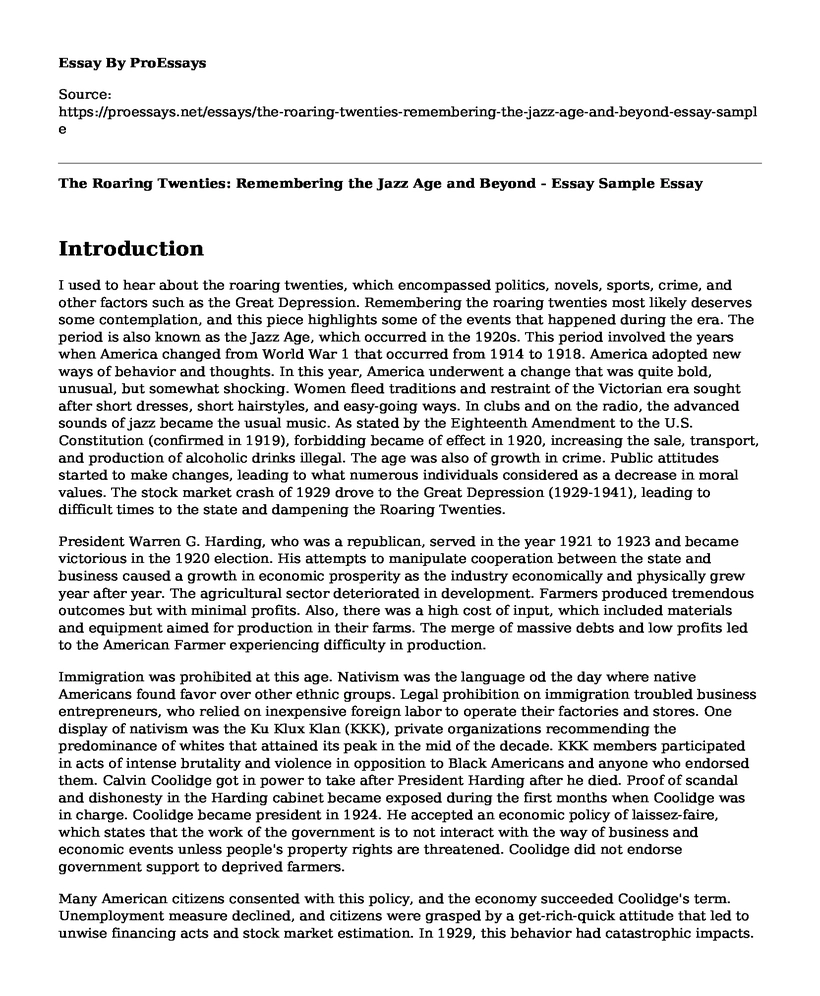Introduction
I used to hear about the roaring twenties, which encompassed politics, novels, sports, crime, and other factors such as the Great Depression. Remembering the roaring twenties most likely deserves some contemplation, and this piece highlights some of the events that happened during the era. The period is also known as the Jazz Age, which occurred in the 1920s. This period involved the years when America changed from World War 1 that occurred from 1914 to 1918. America adopted new ways of behavior and thoughts. In this year, America underwent a change that was quite bold, unusual, but somewhat shocking. Women fleed traditions and restraint of the Victorian era sought after short dresses, short hairstyles, and easy-going ways. In clubs and on the radio, the advanced sounds of jazz became the usual music. As stated by the Eighteenth Amendment to the U.S. Constitution (confirmed in 1919), forbidding became of effect in 1920, increasing the sale, transport, and production of alcoholic drinks illegal. The age was also of growth in crime. Public attitudes started to make changes, leading to what numerous individuals considered as a decrease in moral values. The stock market crash of 1929 drove to the Great Depression (1929-1941), leading to difficult times to the state and dampening the Roaring Twenties.
President Warren G. Harding, who was a republican, served in the year 1921 to 1923 and became victorious in the 1920 election. His attempts to manipulate cooperation between the state and business caused a growth in economic prosperity as the industry economically and physically grew year after year. The agricultural sector deteriorated in development. Farmers produced tremendous outcomes but with minimal profits. Also, there was a high cost of input, which included materials and equipment aimed for production in their farms. The merge of massive debts and low profits led to the American Farmer experiencing difficulty in production.
Immigration was prohibited at this age. Nativism was the language od the day where native Americans found favor over other ethnic groups. Legal prohibition on immigration troubled business entrepreneurs, who relied on inexpensive foreign labor to operate their factories and stores. One display of nativism was the Ku Klux Klan (KKK), private organizations recommending the predominance of whites that attained its peak in the mid of the decade. KKK members participated in acts of intense brutality and violence in opposition to Black Americans and anyone who endorsed them. Calvin Coolidge got in power to take after President Harding after he died. Proof of scandal and dishonesty in the Harding cabinet became exposed during the first months when Coolidge was in charge. Coolidge became president in 1924. He accepted an economic policy of laissez-faire, which states that the work of the government is to not interact with the way of business and economic events unless people's property rights are threatened. Coolidge did not endorse government support to deprived farmers.
Many American citizens consented with this policy, and the economy succeeded Coolidge's term. Unemployment measure declined, and citizens were grasped by a get-rich-quick attitude that led to unwise financing acts and stock market estimation. In 1929, this behavior had catastrophic impacts. The stock market crash led the country into the Great Depression. The crash took place on October 29, 1929, only eight months into the term of President Herbert Hoover. The expectation of the country had appeared bright when he became president. However, in a month of the crash, more than 600,000 to 3.1 million citizens were unemployed. Many were hungry and without homes, and America lasted the next ten years looking for work and a new sense of identity.
The age was captured by many writers such as novelist Scott Fitzgerald. He wrote a variety of novels, and one of his famous books was the Great Gatsby, published in 1925. It identifies the topic of tradition as opposed to contemporary culture. Another novelist is Ernest Hemingway was considered to be part of the long generation. Also, there was a rise in leisure time which allowed people to take part in sports and enjoy spectating-more than 200 million dollars was used in the sports industry. Before world war 1, boxing was deemed as a violent sport. Views and perspectives, as well as the rules on the sport, changed, and many started to enjoy the sport. The roaring twenties was the feedback of a state weary of war and ready to take pleasure in life and others. It encompassed optimism and hope but faced the effects of the Great Depression.
Cite this page
The Roaring Twenties: Remembering the Jazz Age and Beyond - Essay Sample. (2023, May 02). Retrieved from https://proessays.net/essays/the-roaring-twenties-remembering-the-jazz-age-and-beyond-essay-sample
If you are the original author of this essay and no longer wish to have it published on the ProEssays website, please click below to request its removal:
- Levitsky and Way vs. Diamond Debate: Democracy in Recession
- Who's the Star: Mao Zedong Essay
- The Twentieth Century and the African Americans - Paper Example
- Essay on Reconstruction Through World War II
- The Legacy of Slavery: US History of African Americans - Essay Sample
- Essay Sample on Tension Mounts as US & Iran Edge Closer to War
- Essay Example on Mexican-Americans During WWII: A Perspective







